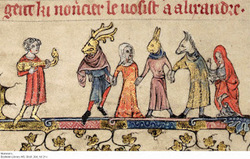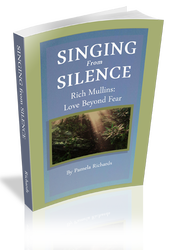
I've observed in radio interviews that Rich Mullins was fairly consistently asked to explain the personal meaning behind his most recently released songs. His responses were extremely guarded. When asked why he'd written a song, or what it meant to him personally, he was more likely to describe the immediate set of circumstances that led up to the songwriting event. His personal reasons for writing a given song remained opaque.
Here's a paraphrase of a radio interview:
Interviewer: "What does the song "Maker of Noses" mean to you?"
RWM: (offers a long discussion of the events leading up to the writing of the song. His description touches on the need for the song, the pressures surrounding the writing of the song, the physical setting of writing the song, and who he co-wrote it with--without surfacing a single personal association with the song.)
A fan responded to the interview along the lines of, "This is great! I always wondered why he wrote 'Maker of Noses!'"
I don't object to anyone wanting to hear the events that led up to Richard writing any of his songs. I would like to point out, though, that if we think Richard answered that question, we've all bought a song--and a dance.
That is a statement of admiration, not hostility. I love Richard's understanding of how to use his talents. The dance move which allows him to sidestep that question is not executed as an evasion: it is a gift to his audience. Richard valued the fact that his songs spun out multiple meanings for his listeners. His silence about the personal significance of his songs preserved for his audience members the gift of making their own associations.
Far from being deceptive, Richard was doing what a good Quaker elder would do--throwing us back on our own Inner Teacher to unfold the truths these songs were meant to show us. I believe the artist is correct to deflect attention from the personal to the universal. This is part of what William Butler Yeats meant when he described the performer's Mask. This is not the mask of self-deception and separation from God; rather, this Mask is a tool in the hands of the artist to bring the members of the audience into contact with their own inner dialogue. Richard used it wisely, and he used it well.
Yet its use comes at a sacrifice. The performer knows that the Mask means that very few people know who he really is. During his lifetime, the Mask will make him a lonelier man, but it will multiply his gift to his audience. Now that Richard is no longer here with us, we each have the option of deciding for ourselves how long we need to keep him behind the performer's mask.
Would he want us to know who he was? During his lifetime, his privacy was quite important to him. But his privacy is of no use to him now that his life on earth has ended. Meanwhile, we do know he deeply regretted being placed on a pedestal by his audience. Some among his fans seem to be drawn to the Rich Mullins phenomenon, yet they do not appear to be ready to deal with the person himself. "I don't want to know about his personal life," some say.
I understand the hesitation.
What if the man behind the mask isn't simply "just like us?" What if he is more challenging to love, or more wounded than we thought? What if he is even more gifted than we had imagined? What if we found him beyond explanation or comprehension? What category would we put the wild man Rich Mullins in to keep ourselves safe from his effect on us? What if his God was too big for the box we want to build for him?
To see beyond the mask is to begin to take greater steps in faith. Not everyone is ready for the journey at the same time, and no one needs to be pushed. It's something like the moment when we learn our parents were human, that they made some of the same mistakes they warned us not to make. It's shocking yet comforting to realize that even those we thought were perfect have faced their moments of trial, loss, repentance, grace. In fact, we can begin to experience compassion for them, which this is the true gateway to the Kingdom of Heaven within us.
Anyone ready for an inside look at the life and creative journey of the early Rich Mullins? "No, leave the mask there," some will say. To which I'd respond, "Which mask?" We've had the CCM cleaned-up mask, the Arrow Pointing to Heaven devotional mask, now the fictional Ragamuffin mask. Sadly, the more masks we place to obscure Richard's actual experiences, the more of his unique identity we bury; the more we project our own issues onto him, the less we can learn from his life.
Scriptures show us an entirely different approach to humanity's stumbling. Not even one of the people we meet in these pages is masked like a performer or kept on a pedestal like a celebrity. Adam falls, Noah drinks, Abraham panders, Jacob deceives, Moses both blasphemes and murders, King David, to his heartfelt remorse, murders and commits adultery, Jonah bolts, Thomas doubts, Peter denies, Paul, aka Saul, persecutes the early church. . . and only One stands out as truly righteous. Why does Scripture force us to face the humanity of these outstanding figures of faith?
It seems there are lessons to be learned from human weakness and failure. Maybe it's because we are so drawn to find what we have in common with great people. Perhaps when we find frailty in the great, we can admit to it in ourselves. All these lessons remain invisible to us, however, while we let the mask hide them.
Every year, there are fewer left this side of the Jordan who remember Richard for who he was behind the mask. The next twenty years or so, give or take a decade, is the time remaining for us to pass on what we know. I may be one of the first to write about Richard's hidden years not because I'm more brave or insightful, but because I feel time passing more quickly. Since even before my stroke, I've had significant health concerns. I don't feel I have the luxury of waiting until a great number of people are interested or ready to seek it out, so I know my writing is not likely to make me popular. My own piece is limited, because like everyone, I'm constrained by time and space. I'm not omniscient; why try to explain or describe what happened between Richard and others when I was not present? I believe it takes a lifetime to learn a life, and so with gratitude I still learn more from Richard all the time.
I know there are others who also have important contributions to make to our understanding of Richard Mullins, and therefore of ourselves. I have the honor of including some in-depth material from one of the musicians who was involved with Richard's creative work during his formative years in Let the Mountains Sing. We can hope to hear more from him and others like him as time goes on.
To those followers Not Ready to Look Behind the Mask:
I understand that this task must be undertaken in faith, and no one can ask you to take it up until you are ready. I respectfully suggest you delay reading non-fictional material about Richard Mullins' hidden years like Singing from Silence and Let the Mountains Sing as long as the Holy Spirit allows.
This is the first in a nine-part series on the upcoming book, Let the Mountains Sing. For Part Two, click here.

 RSS Feed
RSS Feed
